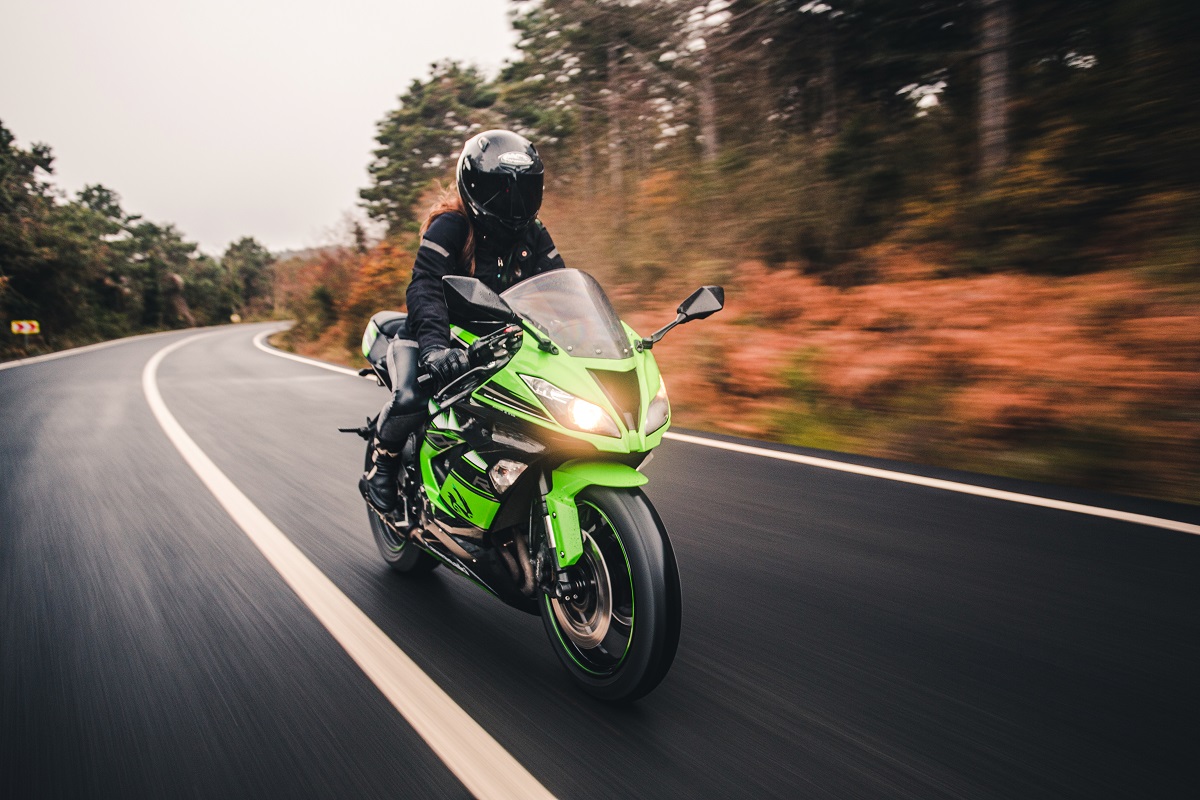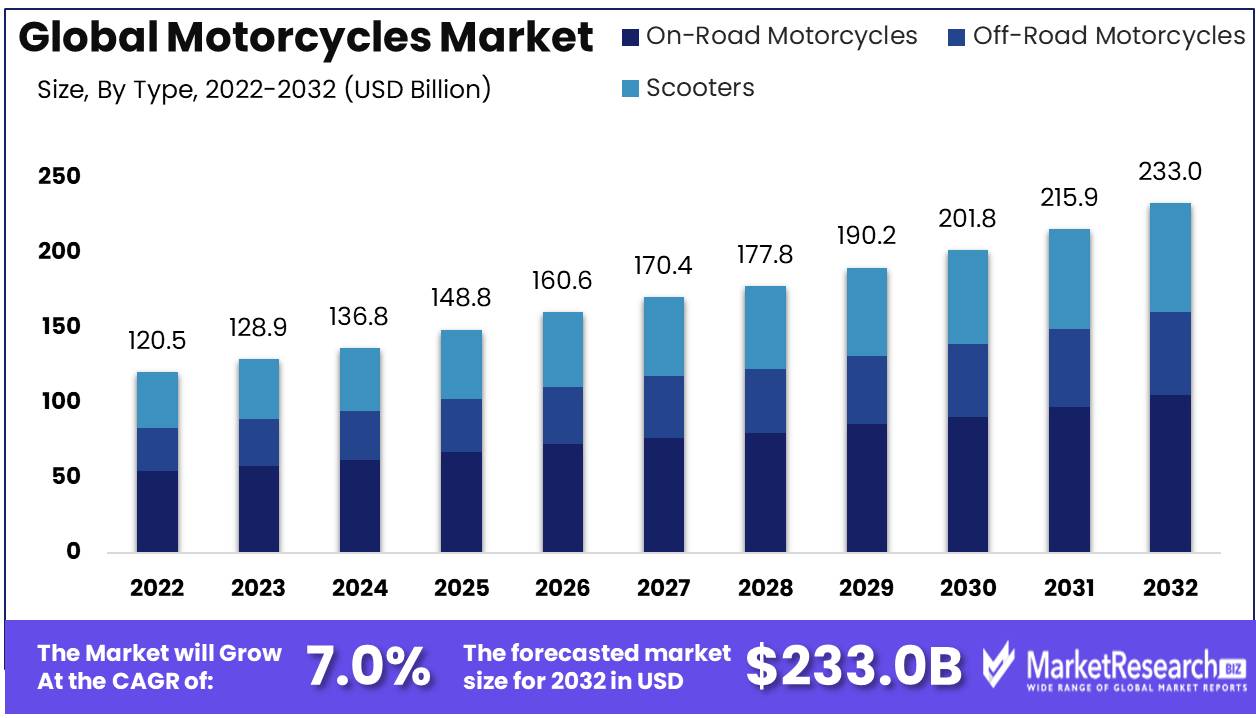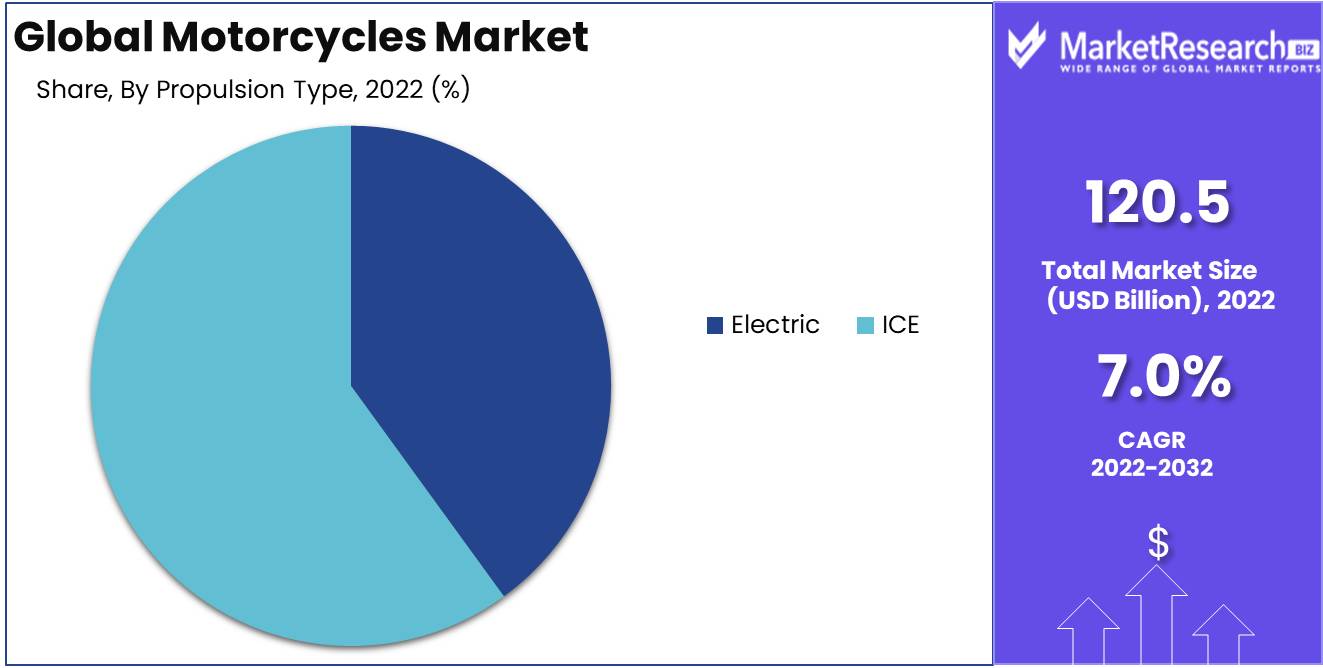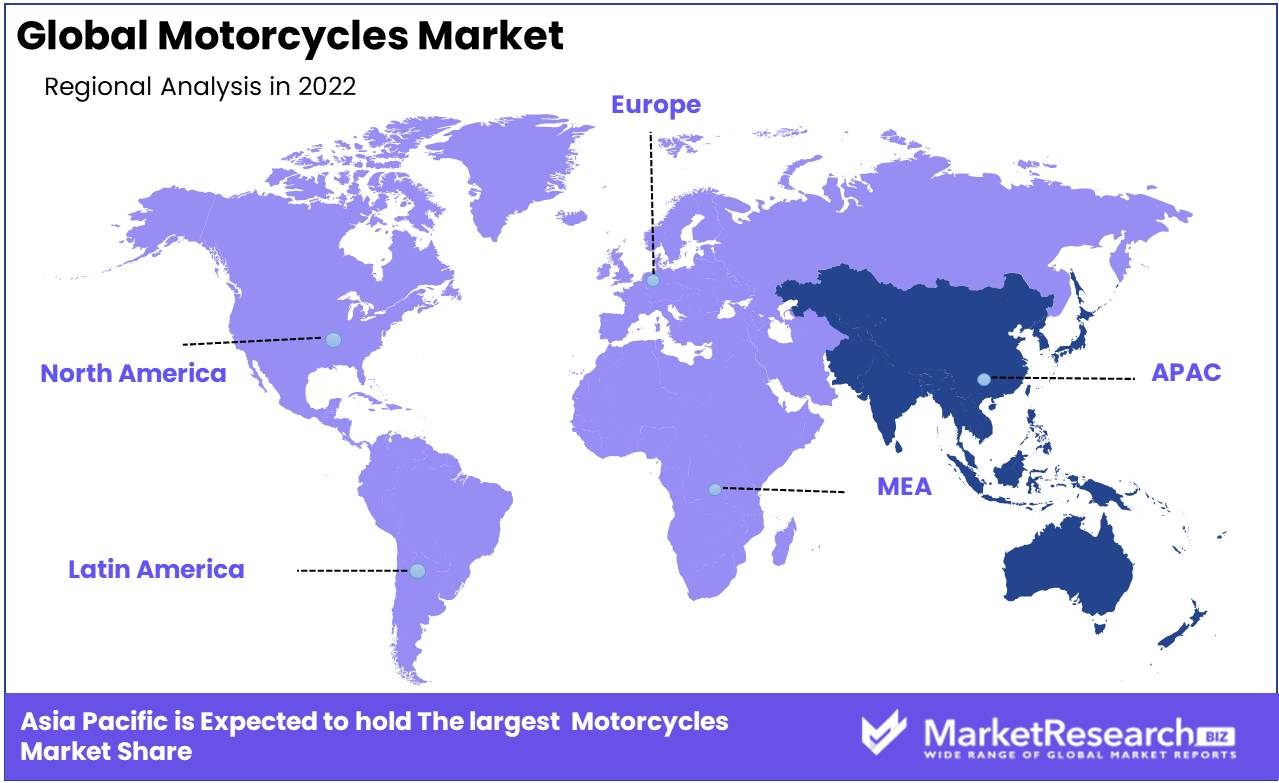
Motorcycles Market By Type (On-Road Motorcycles, Off-Road Motorcycles, Scooters), By Propulsion Type (Electric, ICE), By Region And Companies - Industry Segment Outlook, Market Assessment, Competition Scenario, Trends, And Forecast 2023-2032
-
39849
-
July 2023
-
179
-
-
This report was compiled by Kalyani Khudsange Kalyani Khudsange is a Research Analyst at Prudour Pvt. Ltd. with 2.5 years of experience in market research and a strong technical background in Chemical Engineering and manufacturing. Correspondence Sr. Research Analyst Linkedin | Detailed Market research Methodology Our methodology involves a mix of primary research, including interviews with leading mental health experts, and secondary research from reputable medical journals and databases. View Detailed Methodology Page
-
Quick Navigation
Report Overview
Motorcycles Market size is expected to be worth around USD 233.0 Bn by 2032 from USD 120.5 Bn in 2022, growing at a CAGR of 7.0% during the forecast period from 2023 to 2032
The motorcycles refers to the sector within the transportation industry that deals with manufacturing, distribution, and commercial transactions related to motorcycles. It plays an essential role in providing cost-effective and efficient transportation solutions for both individuals and businesses alike. This report seeks to provide an in-depth examination of this market by outlining its definition, goals, significance, and benefits; in addition to noting innovations made, investments made, integration into various products/services, etc.

The motorcycles market has witnessed significant advances and innovations throughout its history. A key technological advance involves the emergence and progression of electric motorcycles (commonly referred to as e-bikes). Electric motorcycles utilize electric motors instead of traditional internal combustion engines for propulsion, providing multiple benefits like operating without emitting harmful substances, mitigating noise pollution, cost savings on maintenance expenses, and offering practicality and consumer appeal benefits; due to advancements in battery technology, this trend continues to gain ground.
Another noteworthy development involves the incorporation of advanced safety features into motorcycles. Recently, manufacturers have increasingly implemented technological advancements like antilock braking systems (ABS), traction control systems, and electronic stability controls into their products to enhance rider safety and reduce accident rates on demanding roads. Such attributes serve to decrease incidences of accidents as well as enhance riders' abilities to maneuver effectively when confronted by adverse road conditions.
The motorcycles market has seen notable advancements in both design and materials, resulting in motorcycles with reduced weight, enhanced aerodynamics, and superior aesthetics. Manufacturers are using lightweight materials such as carbon fiber or aluminum for greater fuel efficiency while maintaining durability and strength;
The motorcycles market has attracted significant investments from both established companies and emerging ventures looking to capitalize on rising motorcycle demand. Prominent technology conglomerates, like Google, have invested substantially in enterprises focused on self-driving motorcycle technology - tapping into its potential within the motorcycle sector.
Furthermore, ridesharing platforms have identified motorcycles market as an opportunity for expanding their services. Companies such as Uber and Lyft have implemented motorcycle transportation services in certain markets where riding motorcycles is popular as an alternate mode of commuting; providing individuals an additional mode of transport while giving ridesharing companies an avenue to reach more people with their services.
Motorcycles have become an integral component of numerous business sectors over time. Deliveries services have adopted motorcycle use as a strategy to maximize operational efficiency and minimize delivery times; similarly, motorcycles are employed by e-commerce enterprises, food delivery platforms, and logistics providers to meet increasing customer demands for expedited delivery services.
Driving factors
Urbanization is a Catalyst for the Expansion of the Motorcycles Market
Effective transportation is essential as the world's population rapidly urbanizes. Motorcycles are a popular alternative for city inhabitants due to the rise of congested roadways and scarce parking places brought on by urbanization. Urban motorcycles have various advantages over four-wheeled vehicles. They can weave through traffic and improve efficiency due to their size. Motorcycles take up less room in cities.
Traffic Demanding Efficient Transportation
Traffic jams plague cities globally. Gridlocks reduce production, raise pollution, and stress commuters. Motorcycles can alleviate traffic congestion in such situations. Their mobility speeds riders through congested roads, reducing travel times. Motorcycles also use less fuel than cars, making them a cost-effective option for individuals who want to save money while dealing with traffic issues.
Recreational and Adventure Riding Popularity
Motorcycles symbolize freedom and adventure. A surge in motorcycle sales can be attributed to the growing popularity of recreational and adventure riding. Long rides, fresh terrains, and open roads excite many riders. Vacationing, touring, and motorcycle events have grown in popularity, and the motorcycles market has seen demand rise. This tendency has spurred the industry's expansion as manufacturers design adventure motorcycles.
Motorcycle Sharing and Rental Expansion
Motorcycle sharing and rental services have emerged as a practical alternative to car ownership and public transportation in recent years. Individuals can rent motorcycles for short or extended periods, saving money. The rise of ride-sharing platforms and specialized motorcycle rental companies has given people access to motorcycles without ownership. This expansion in shared mobility choices has made motorcycles more accessible, adding to a surge in demand and benefiting the motorcycles market.
Motorbike Technology
Technological improvements have changed the motorcycle industry, improving safety, performance, and comfort. Advanced features include ABS, traction control, riding modes, and electronic suspension. These technologies have increased rider safety and experience. Motorcycles now integrate seamlessly with cellphones, allowing riders to use navigation, music, and communication while on the go. As the world moves toward greener transportation, electric motorcycles offer consumers a sustainable and eco-friendly option.
Restraining Factors
Safety and Accidents
The motorcycles market attracts riders of all ages. However, the market has significant restraining factors that can hinder its growth and performance. One is safety and accident risks with motorcycles. Given the vulnerability of motorcycle riders compared to those in enclosed cars, safety has always been a top priority when it comes to motorcycles. Motorcycles can cause serious injuries or death, which worries potential customers. Concerns over safety may dissuade some individuals from acquiring a motorbike, affecting market growth and safety.
Regulatory Restrictions and Licensing
Another significant restraining factor in the motorcycles market is governmental regulations and licensing requirements. Motorcycle firms typically struggle to expand due to these country-specific requirements. Emission restrictions, noise limits, safety equipment requirements, and rider licensing are examples of regulations. Complying with these regulations can add significant expenses to motorcycle production and limit model sales.
Fuel Prices Are Fluctuating
Another restraining aspect of the motorcycles market is fluctuating fuel prices. Gasoline is the main fuel for motorcycles, therefore a significant price increase can hurt demand. Consumers want fuel-efficient transportation when fuel prices rise. Motorcycles are more fuel-efficient than cars, but demand may drop if individuals move to electric cars or public transportation. This can lead to lower sales and the motorcycles market's profitability.
Limited Storage and Passenger Capacity
A further restraining element in the motorcycles market is limited storage and passenger capacity. Motorcycles have less storage room than vehicles, making it hard for riders to store groceries, personal items, and more. For individuals who rely significantly on their vehicles for everyday chores or commuting, this limitation might be a significant downside. Motorcycles' low passenger capacity may deter individuals who travel with friends. Motorcycles are frequently thought of as a solitary transportation choice, but the lack of passenger space can hinder consumers, especially those who value convenience and versatility.
Adverse Weather
Adverse weather conditions are a restraining issue for the motorcycles market in difficult areas. Rain, snow, strong gusts, and extreme temperatures can make riding motorcycles uncomfortable or dangerous. In bad weather, riders may pick more covered and weather-ready transportation options, reducing motorcycle use. This might lead to reduced demand for motorcycles in some regions or seasons, reducing market growth and profitability.
Type Analysis
The motorcycles market is diverse and dynamic, catering to enthusiasts' demands and preferences. The On Road Motorcycles Segment dominates the overall market. This section contains motorcycles made for public roads, offering riders a thrilling and efficient form of transportation.
Emerging economies' strong economic growth drives On-Road Motorcycle adoption. As China, India, and Brazil continue to grow at a significant rate, purchasing power rises. More people can afford motorcycles, increasing demand for on-road motorcycles.
In recent years, consumer behavior has shifted toward the On-Road Motorcycles Segment. Riders increasingly value ease, cost, and adaptability in transportation. On-road motorcycles allow riders to handle urban traffic while experiencing the excitement of open roads.
The On-Road Motorcycles Segment's technological and design advances have also had a significant impact on consumer preferences. To improve riding, manufacturers have been adding modern safety systems, fuel-efficient engines, and ergonomic designs. These qualities have attracted both seasoned riders and new riders to motorcycles.
Propulsion Type Analysis
The Internal Combustion Engine (ICE) segment dominates the motorcycles market. For decades, gasoline-powered motorcycles have been the industry standard. Power, reliability, and availability are hallmarks of ICE motorcycles.
Similar to the On-Road Motorcycle Segment, rising economies drive ICE Segment adoption. Affordable transportation is in demand as these economies flourish. ICE motorcycles are affordable for commuters and other users.
Consumer attitudes toward the ICE Segment have stayed consistent. A significant number of riders enjoy the traditional feel and sound of ICE motorcycles, as well as the ease of recharging at gas stations. In order to meet the diverse demands and preferences of riders, the ICE Segment also offers a wide range of engine displacement, style, and performance levels.
In the motorcycles market, the ICE Segment is expected to expand the fastest in the future years. Several things affect this projection. First, emerging economies will continue to grow, driving demand for affordable and dependable transportation. Due to their affordability and availability, ICE motorcycles can meet this demand.

Key Market Segments
By Type
- On-Road Motorcycles
- Off-Road Motorcycles
- Scooters
By Propulsion Type
- Electric
- ICE
Growth Opportunity
Motorcycles Market Explosion
The motorcycle industry is ripe for growth due to factors like the expansion into emerging markets, the development of electric motorcycles, customization, personalization, collaborations with technology companies for connected motorcycles, and a growing focus on women riders. On the strength of these tendencies, let's examine three more growth opportunities that could help the motorcycles market.
Green Motorcycles Green Shift
Consumers across industries have recently been more concerned about the environment. The motorcycles market has a unique potential to invest in the development and integration of sustainable materials and processes because of this trend. Eco-friendly motorcycle materials lower carbon footprint and appeal to environmentally aware consumers.
Motorcycle-Riding Safety Tech
The car industry's safety features have changed due to technology. Advanced safety technologies can help motorcycle manufacturers capitalize on this growth. Collision warning, blind-spot recognition, adaptive cruise control, and autonomous emergency braking improve rider safety. Collaborations with automobile safety technology businesses can hasten the development of motorcycle safety features. Manufacturers can attract safety-conscious buyers by promoting cutting-edge safety technologies, growing the motorcycle market.
AI Transforming Riding
AI has swiftly spread throughout industries, but its potential in motorcycles is still untapped. Motorcycle manufacturers can offer predictive maintenance, adaptive suspension, and semi-autonomous riding modes by utilizing AI technologies. AI-powered systems can monitor rider behavior, road conditions, and weather to optimize performance and safety. Adding technologies like voice control, natural language processing, and gesture recognition can improve user experience and bring tech-savvy consumers to the motorcycles market.
Rising Emerging Markets
Motorcycle manufacturers have expanded into emerging markets with a burgeoning middle class. Affordable, reliable transportation is needed as discretionary incomes rise and the middle class grows. Our organization targets these markets to reach untapped consumer segments with huge growth potential. The industry has been changed by the development of electric motorcycles, addressing environmental concerns and boosting mobility innovation.
Latest Trends
Electric motorcycles and scooters rise
The rise of electric motorcycles and scooters has been revolutionary. The popularity of electric two-wheelers has skyrocketed as a result of the growing emphasis on sustainability and lowering carbon emissions. Eco-friendly solutions decrease noise, energy use, and operational expenses. Electric motorcycles market and scooters are now high-performance and long-range.
Adventure and Touring Motorcycle Growth
Adventure and touring motorcycles are in high demand as more riders seek thrills and adventure on two wheels. These motorcycles market are built for long-distance travel, off-road excursions, and comfort. Adventure motorcycles combine on-road and off-road capabilities, making them adaptable and popular with adventurers. These motorcycles offer a better riding experience in all situations thanks to features like sturdy suspensions, larger fuel tanks for increased range, and cutting-edge rider aids like traction control and configurable riding modes.
ABS and Traction Control Integration
Riders prioritize safety, therefore motorcycle manufacturers add advanced features. ABS and Traction Control are two safety technologies that are becoming more common on motorcycles of all types.ABS prevents wheel lockup during strong braking, reducing skidding and preserving stability. Traction Control reduces wheel slippage and maintains traction on slippery roads or while accelerating. These safety features boost riders' confidence and prevent accidents, making motorcycles market safer for riders and other road users.
Lightweight, Agile Motorcycle Development
Manufacturers of motorcycles market are working on making lightweight, nimble models in response to changing user preferences. These motorcycles are more maneuverable, efficient, and powerful. Lightweight metals and composites have allowed manufacturers to build lighter motorcycles without compromising safety or structural integrity. Lighter motorcycles are easier to control, especially in heavy traffic, making them appealing to commuters and urban riders.
Motorcycle Technology Adoption
Smart and connected technologies' integration has transformed several industries, including the motorcycles market. Manufacturers are adding Bluetooth, GPS, smartphone integration, and heads-up displays to motorcycles. These technologies allow riders to maintain their hands on the handlebars and eyes on the road while receiving important information like turn-by-turn directions, incoming calls, and music. Connected technologies let riders track rides, check motorcycle health, and receive maintenance reminders.
Regional Analysis
Asia-Pacific region has emerged as the dominant force in motorcycles, transforming the industry with its wide production, consumption, and market expansion. Several factors have driven Asia-Pacific motorcycle sales to the top.
First, China and India are two of the world's most populated countries, which favors the Asia-Pacific region. Population development has led to an increase in demand for motorcycles as a means of economical and convenient transportation. Motorcycles are a popular choice for millions of commuters due to congested cities and insufficient public transportation. The region's demand for motorcycles has increased as a result of this production.
The Asia-Pacific region has strong manufacturing and rising demand. International motorcycle manufacturers have realized the potential of the Asia region market and developed production facilities there to fulfill rising demand. Localization of production has produced jobs and led manufacturers to cater to regional tastes. Low labor costs and ideal production conditions have encouraged businesses to locate in the Asia - Pacific region, leading to a significant increase in motorcycles production.
Asia Pacific region has experienced significant technological and innovation developments in motorcycles. This focus on innovation has led to the development of motorcycles that cater to local preferences and requirements, including fuel efficiency, durability, and adaptability to different terrains. These advances have solidified the region's status as a dominant power in the motorcycle market.

Key Regions and Countries
North America
- US
- Canada
- Mexico
Western Europe
- Germany
- France
- The UK
- Spain
- Italy
- Portugal
- Ireland
- Austria
- Switzerland
- Benelux
- Nordic
- Rest of Western Europe
Eastern Europe
- Russia
- Poland
- The Czech Republic
- Greece
- Rest of Eastern Europe
APAC
- China
- Japan
- South Korea
- India
- Australia & New Zealand
- Indonesia
- Malaysia
- Philippines
- Singapore
- Thailand
- Vietnam
- Rest of APAC
Latin America
- Brazil
- Colombia
- Chile
- Argentina
- Costa Rica
- Rest of Latin America
Middle East & Africa
- Algeria
- Egypt
- Israel
- Kuwait
- Nigeria
- Saudi Arabia
- South Africa
- Turkey
- United Arab Emirates
- Rest of MEA
Key Players Analysis
Bajaj Auto Ltd., an Indian two-wheeler and three-wheeler manufacturer, dominates the motorcycles market. Bajaj Auto, with a rich history dating back to 1945, has established its brand as one that produces high-quality, creative, and economical motorcycles. The company's success is due to its commitment to excellence, ongoing innovation, and customer-centric attitude.
BMW AG, a German automaker, has made a name for itself in the motorcycles market. BMW Motorrad's premium motorcycles combine tremendous performance, cutting-edge technology, and unrivaled sophistication. BMW Motorrad's commitment to precision engineering and distinctive design has made the brand.
Ducati Motor Holding S.p.A is synonymous with flair, performance, and riding excitement. Ducati's high-performance motorcycles are known globally from Borgo Panigale, Italy. Ducati's concentration on modern technology, stylish design, and excellent craftsmanship has made it a motorcycle fan favorite. Ducati's wide range of motorcycles meets diverse riding styles and sets performance and innovation standards.
Eicher Motors Limited, an Indian multinational, dominates the motorcycles market with Royal Enfield. Royal Enfield motorcycles are beloved worldwide for their classic design, sturdy structure, and distinctive pounding sound. Its ability to combine classic beauty with modern technology has made the brand a competitive competitor in the motorcycles market. Royal Enfield motorcycles' popularity has grown due to Eicher Motors' commitment to great riding experiences.
American motorcycle maker Harley-Davidson, Inc. is revered globally. Harley-Davidson represents road freedom with its powerful engines, unique design, and long history. The company's motorcycles embody adventure, revolt, and uniqueness. Harley Davidson has maintained its position as a prominent player in the motorcycles market despite setbacks and changing market dynamics thanks to its commitment to its basic beliefs.
Top Key Players in the Motorcycles Market
- Bajaj Auto Ltd. (India)
- BMW AG (Germany)
- Ducati Motor Holding S.p.A (Italy)
- Eicher Motors Limited (India)
- Harley-Davidson, Inc. (U.S.)
- Hero MotoCorp Ltd. (India)
- China Jiailng Industrial Co., Ltd (China)
- Honda Motor Co., Ltd. (Japan)
- KTM Sportmotorcycle GmbH (Austria)
- Kawasaki Heavy Industries, Ltd. (Japan)
- Piaggio and C. SpA (Italy)
- Suzuki Motor Corporation (Japan)
- Triumph Motorcycles (U.K.)
- TVS Motor Company (India)
- Vmoto Limited ABN (Australia)
- Yamaha Motor Co., Ltd. (Japan)
- Zero Motorcycles, Inc (U.S.)
Recent Development
- In 2023, In a revolutionary stride toward sustainable mobility, Harley-Davidson announced the highly anticipated launch of its LiveWire One electric motorcycle, set to hit the roads.
- In 2022, Honda's ADV150 adventure motorcycle, set to debut, is also creating waves.
- In 2021, BMW Motorrad's R 18 Transcontinental is set to revolutionize luxury touring motorcycles.
- In 2020, With the launch of the FTR 1200 S, American motorcycle manufacturer Indian Motorcycles revived flat-track racing.
- In 2019, With the introduction of the game-changing 1290 Super Adventure R Austrian manufacturer KTM established itself in the adventure motorcycle market. Designed for extreme terrain.
Report Scope
Report Features Description Market Value (2022) USD 120.5 Bn Forecast Revenue (2032) USD 233.0 Bn CAGR (2023-2032) 7.0% Base Year for Estimation 2022 Historic Period 2016-2022 Forecast Period 2023-2032 Report Coverage Revenue Forecast, Market Dynamics, COVID-19 Impact, Competitive Landscape, Recent Developments Segments Covered By Type(On-Road Motorcycles, Off-Road Motorcycles, Scooters), By Propulsion Type (Electric, ICE) Regional Analysis North America – The US, Canada, & Mexico; Western Europe – Germany, France, The UK, Spain, Italy, Portugal, Ireland, Austria, Switzerland, Benelux, Nordic, & Rest of Western Europe; Eastern Europe – Russia, Poland, The Czech Republic, Greece, & Rest of Eastern Europe; APAC – China, Japan, South Korea, India, Australia & New Zealand, Indonesia, Malaysia, Philippines, Singapore, Thailand, Vietnam, & Rest of APAC; Latin America – Brazil, Colombia, Chile, Argentina, Costa Rica, & Rest of Latin America; Middle East & Africa – Algeria, Egypt, Israel, Kuwait, Nigeria, Saudi Arabia, South Africa, Turkey, United Arab Emirates, & Rest of MEA Competitive Landscape Bajaj Auto Ltd. (India), BMW AG (Germany), Ducati Motor Holding S.p.A (Italy), Eicher Motors Limited (India), Harley-Davidson, Inc.'s (U.S.), Hero MotoCorp Ltd. (India), China Jiailng Industrial Co., Ltd (China), Honda Motor Co., Ltd. (Japan), KTM Sportmotorcycle GmbH (Austria), Kawasaki Heavy Industries, Ltd. (Japan), Piaggio and C. SpA (Italy), Suzuki Motor Corporation (Japan), Triumph Motorcycles (U.K.), TVS Motor Company (India), Vmoto Limited ABN (Australia), Yamaha Motor Co., Ltd. (Japan), Zero Motorcycles, Inc (U.S.) Customization Scope Customization for segments, region/country-level will be provided. Moreover, additional customization can be done based on the requirements. Purchase Options We have three licenses to opt for: Single User License, Multi-User License (Up to 5 Users), Corporate Use License (Unlimited User and Printable PDF) -
-
- Bajaj Auto Ltd. (India)
- BMW AG (Germany)
- Ducati Motor Holding S.p.A (Italy)
- Eicher Motors Limited (India)
- Harley-Davidson, Inc. (U.S.)
- Hero MotoCorp Ltd. (India)
- China Jiailng Industrial Co., Ltd (China)
- Honda Motor Co., Ltd. (Japan)
- KTM Sportmotorcycle GmbH (Austria)
- Kawasaki Heavy Industries, Ltd. (Japan)
- Piaggio and C. SpA (Italy)
- Suzuki Motor Corporation (Japan)
- Triumph Motorcycles (U.K.)
- TVS Motor Company (India)
- Vmoto Limited ABN (Australia)
- Yamaha Motor Co., Ltd. (Japan)
- Zero Motorcycles, Inc (U.S.)




